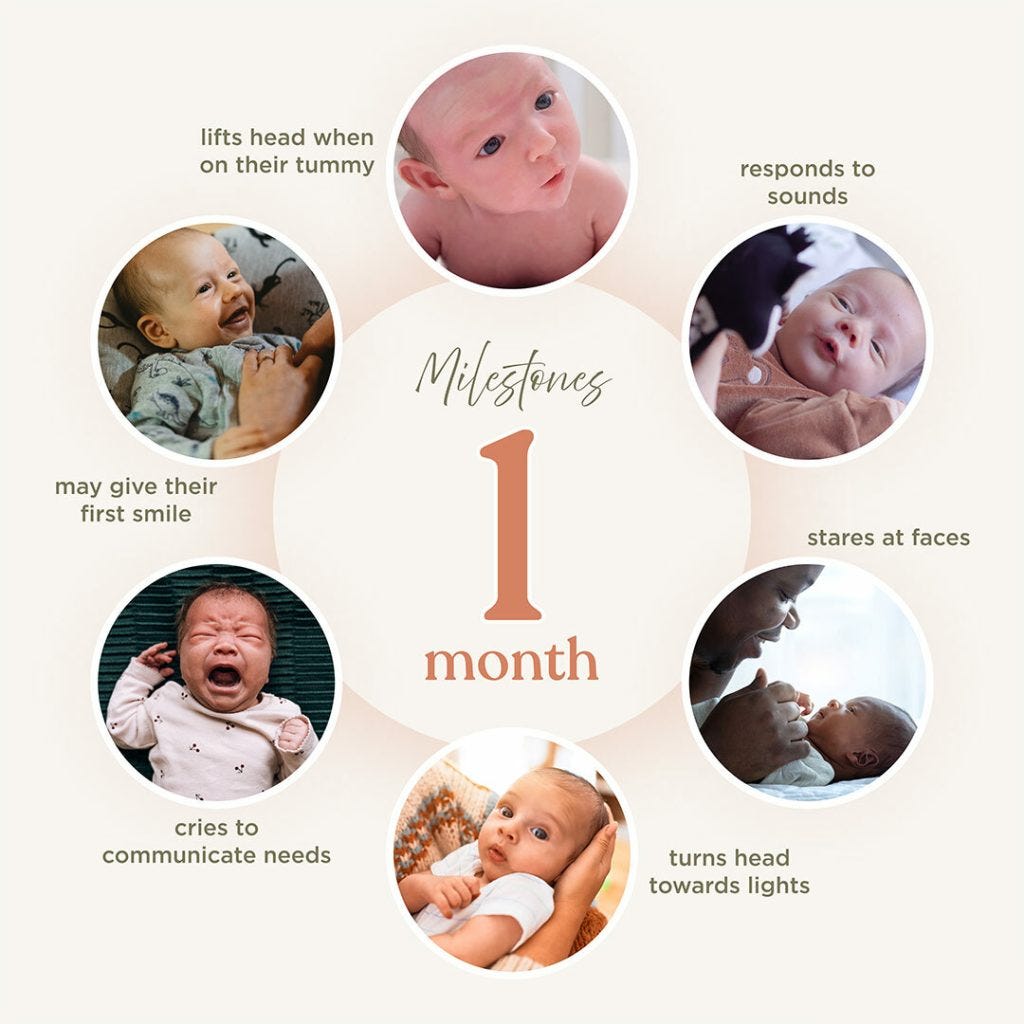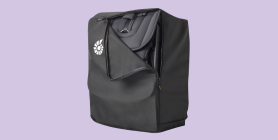Page 5 - Ergobaby
It happens so quickly. Week after week, this little newborn surprises you with a new, more developed skill. Time is racing and you probably want to freeze it to preserve every moment. The bad news is that unfortunately, that's not possible. The good news is that many unforgettable moments still await you - incredibly exciting and beautiful. And every age and stage has something special, something unique, along with new challenges of course.
So that you know what to expect, last month we launched our new blog series "Baby's developmental milestones with Ergobaby: Baby's first year” starting with “Your 1 month old baby”.
With the help of our midwife Katrin Ritter, we would like to share what new skills and abilities your baby could learn in each month. Of course, the periods we talk about are only guidelines, as every baby develops at their own pace. But we’ll tell you which baby milestones you can look out for in your little miracle and which you can even encourage through play. Today
How babywearing, breast/chestfeeding and co-sleeping can strengthen this bond
Bonding. A term that is probably buzzing around in the heads of many expectant parents. Some have already dealt with it intensively and know the importance of bonding with baby and how they plan to do it. Others may worry that they will not be able to build a good and healthy attachment relationship with their baby. And others haven't thought about it much at all.
Our babywearing survey, which we conducted together with babyforum.at in summer 2023, focused precisely on this bonding process and the question of what role a baby carrier plays in this. The result of the survey: 95.5 per cent of respondents who already have children stated that they had used a baby carrier or wrap to build a bond and closeness with their baby. You can find out more about this in our blog article “Babywearing benefits: why carry your baby?”. At 91.2 per cent, breastfeeding was in second place as a means of bonding, followed by co-sleeping
The topic of sex after birth remains a turbulent one. After all, everything suddenly revolves around your new baby. And yet, your own needs and your relationship should not be neglected. You can be rest assured, you are not alone with this topic. Intimacy after having a baby is something that comes up for most couples. Dutch sexologist and anthropologist Mandy Ronda confirms this. Time and again she receives questions like: “Since we had a baby, it’s really impossible to have sex spontaneously. We sometimes hear about putting sex on the agenda. But how can we schedule it?”
Read more about what the “sex expert” advises….
Mandy Ronda, sexologist and anthropologist:
“The fact is, your couple relationship changes after the birth of your baby. And it’s the same with your sexual relationship. A first step would therefore be to accept that sex or the desire for sex no longer arises spontaneously. So don’t compare your sex life after the birth with the time before the birth. Because now a whole
Any element of parenting is full of myths and old wives’ tales, and babywearing is no different. While these are slowly dying out, there are still people desperate to tell you that baby carriers aren’t safe, aren’t comfortable, are too tricky to use... the list goes on. So we’re here to bust five more babywearing myths (you can see our last blog on this here)! Take a look and see if any of them sound familiar...
Myth 1: "All baby carriers cause neck or back pain."
This is the one we hear the most and it’s normally the easiest to fix! If a carrier is causing pain it is usually due to the incorrect use or fit of the carrier. One of the most common problems is that baby is too low and the back strap that connects both arms straps isn’t positioned correctly.
Many parents think that this connecting strap between the shoulder straps is only there to prevent the straps from slipping off the shoulders. As a result, this strap receives little attention and often remains at the top of the neck
Carrying a baby close to you is probably one of the most beautiful moments in the lives of new parents. But then as a company that manufactures ergonomic baby carriers we would say that right? That's why we wanted to know from you whether this is really the case. What exactly are your reasons for babywearing? There are plenty of babywearing benefits, but which ones motivate you the most? To find out, we took part in a babywearing survey conducted by babyforum.at. 7,094 people from Germany, Austria and Switzerland took part. Many of them were already mums and dads, and the rest were about to become parents at the time of the survey. The aim was to find out how modern parents use, or plan to use a baby carrier in their everyday lives. And to what extent they think it contributes to building a bond between carer and child.
Babywearing benefits: do you really need a carrier?
But here and now we are interested in one thing above all: Why do you carry your children at all? Why do you use a baby
Is your Ergobaby baby carrier a use-it-every-day kind of item? We hope so! After all, cuddling with your little miracle is one of the most beautiful things there is. And an ergonomic baby carrier is practical to boot. So, if your baby carrier is in constant use, then you probably also know it’s prone to stains and spills. The baby spits up, chews on the shoulder straps, a small (or large!) nappy mishap happens, or some milk drips onto the material when breast/chestfeeding and carrying.
You don't always have to wash the entire baby carrier immediately. Sometimes you can just remove the stain with a damp cloth, some mild detergent or washing-up liquid and lukewarm water. In other cases, however, there is probably no way around the washing machine. And that's why today we're giving you a simple guide on how to wash your Ergobaby baby carrier in a way that is gentle on the material and the environment.
How often can I wash my carrier?
Generally speaking, you can wash your carrier as often
Colostrum... what? If you don’t know what this term means, or if you do but you don’t really know details, then you’re not alone! Especially if you don’t already have children, or aren’t planning to breast/chestfeed. But if you are planning on feeding baby this way and would like to know more, then we’ve got you! Today we’re talking all about colostrum: what it is, when you can start expressing it, how to collect it, everything you need to know.
What is colostrum?
Colostrum is the medical term for the first milk produced by your body during pregnancy (from around the 16th week of pregnancy). It is also called first milk, colostrum or even "liquid gold" due its colour and incredible properties. Tailored to your newborn's needs, it is highly concentrated and rich in proteins and nutrients. In addition, the first milk is low in fat, easy for your baby to digest and very important for their development. Up to two thirds of the cells in colostrum are white blood cells, which protect against
We have already announced our brand-new blog series "Milestones" and now it’s here! We’ll be sharing all the baby developmental milestones that your little one goes through up to their first birthday. Month by month. With the help of our lovely midwife and baby expert Katrin. Today in focus: "your 1 month old baby".
So, what happens in your baby's development during the first four weeks after birth? Firstly, we would like to emphasise that every baby is an individual and develops at their own pace. Some move quicker in terms of motor skills, and others make faster cognitive progress. The following developmental stages are therefore merely guidelines. If your child is not yet showing one or two skills, give them time. It will come. And if you are ever concerned, you should talk to your midwife, health visitor or GP about whatever is troubling you.
1 month baby milestones:

They lift their head while in the prone (tummy time) position
You know the drill: your baby's head needs a lot of support
From traditional lullabies to high-tech white noise machines, using songs and music to help babies sleep is an age-old tradition for a reason. Our UK sleep specialist Gemma Coe is a mum of two and a certified baby and child sleep consultant. She helps families all over the world develop healthy sleep habits. Today she’s sharing with us her thoughts on whether white noise or lullabies or both are the key to a great night’s sleep.
What is it about a song or lullaby that helps little ones fall asleep?
Have you ever found yourself singing that lullaby to your baby with a sense of peace and calm? Sensing the slow, repetitive nature of the song and how it can tie naturally in with gentle rocking and movement? Song, the sense of presence, and the gentle rocking or patting motion or other repetitive movements, can certainly help calm fussy babies and help manage a (sometimes fraught) transition between day and night.
Adding some 'music therapy' into your bedtime routine is a win! Check out the
"Happy birthday to you, happy birthday to you..." How quickly does time fly? Our Evolve 3-in-1 highchair is celebrating its first birthday this month! Our Ergobabies are just like your babies (sort of)! They've only just been born but in what feels like the blink of an eye they're already a year old, sitting at the table with you, and getting very messy.
However, this also means that your baby gear has to grow with your child at this rapid pace: first a high chair as soon as they can sit upright; followed in no time by your toddler's desire for independence to sit at the table by themselves. And not to mention them wanting to help and be involved with everything you’re doing, making a learning tower essential. But before you head out to get multiple gadgets for all these different developmental stages and needs, you can have it all in one. Because our Evolve 3-in-1 High Chair, offers all these functions and grows with your child! And it's ergonomic of course! In this blog, we take a detailed



















